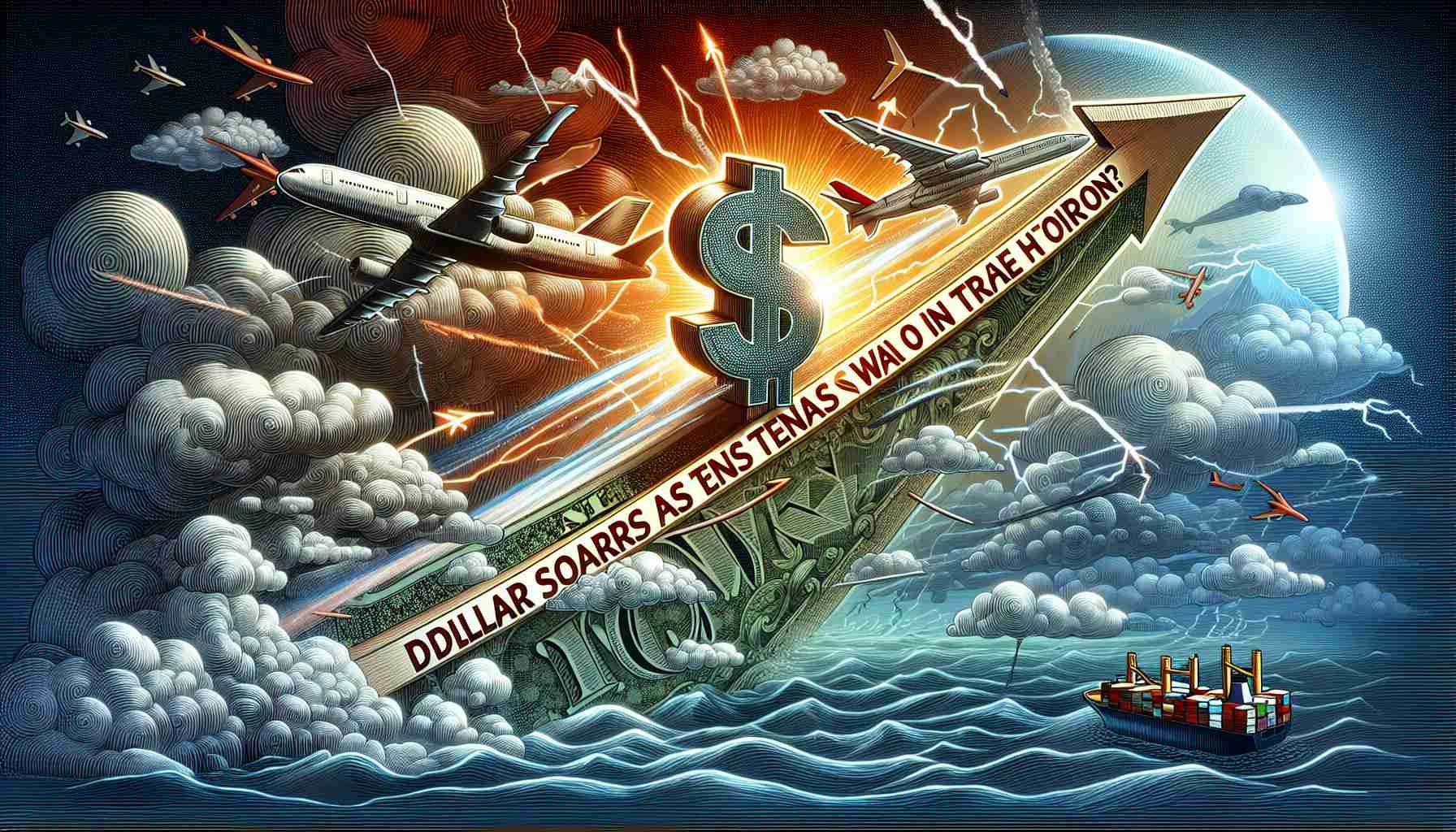- The U.S. dollar surged sharply due to new tariffs imposed on imports from Canada, Mexico, and China.
- Asian markets reacted negatively, with significant declines in Japan’s Nikkei 225 and Hong Kong’s Hang Seng Index.
- The Mexican peso fell amidst inflation forecasts, and Canada’s economy is projected to contract by 2.7% this year.
- Experts express concerns that rising tariffs may further weaken Asian currencies and amplify global financial instability.
- Commodity prices are affected, with gold prices falling and crude oil trending upwards amid these economic changes.
- The situation raises questions about the potential for ongoing trade conflicts and their long-term impact on the global economy.
The financial world shook on Monday as the dollar skyrocketed against a backdrop of escalating trade tensions. Following a bold move by Donald Trump, hefty tariffs were imposed on imports from key partners: a staggering 25% on goods from Canada and Mexico, and 10% on Chinese imports. This announcement sent ripples through global markets, causing Asian stocks to plummet while investors braced for what many fear could spark a full-blown trade war.
In Japan, the Nikkei 225 sank over 2%, while Hong Kong’s Hang Seng Index also experienced significant losses. The peso dropped dramatically, pulled down by predictions of soaring inflation in Mexico – analysts estimate it could hit 6%. Meanwhile, analysts warned that Canada could face a 2.7% economy contraction this year.
Investment expert Stephen Innes noted that while the move wasn’t entirely unexpected, it jolted the markets, already struggling under the weight of previous tech sector volatility. With tariffs looming, Asian currencies and risk assets are likely to weaken further, raising concerns about global financial stability.
The ramifications stretched beyond mere currencies; gold prices dipped after touching record highs, making it pricier for international buyers due to the robust dollar. Crude oil also edged higher as the tariffs target significant commodities traded across borders.
As the dust settles, the world watches closely – the key takeaway here is that these bold tariff implementations could have lasting effects on the global economy, leaving market participants anxious about what will come next. Will diplomatic ties fray further? The answer may determine the financial landscape for years to come.
Global Trade Crisis: How Tariffs Are Reshaping the Financial Landscape
The recent escalation of trade tensions, marked by the imposition of significant tariffs by the United States, has had far-reaching effects on global markets. As the dollar strengthens, the ramifications are felt worldwide, leading to turbulent financial conditions and shifts in investment strategies.
Pros and Cons of Tariffs on Trade
Pros:
– Protection of Domestic Industries: Tariffs can protect local manufacturers from foreign competition, potentially safeguarding jobs and encouraging domestic production.
– Increased Government Revenue: Import tariffs can lead to increased government revenue, which can be allocated to infrastructure and services.
Cons:
– Higher Consumer Prices: Tariffs often lead to higher prices for consumers as the cost of imported goods rises.
– Retaliatory Measures: A cycle of retaliatory tariffs can increase tensions between trading partners and result in trade wars, harming global economic stability.
Market Forecasts and Trends
Analysts predict that ongoing trade tensions will contribute to volatility in currency markets, particularly for Asian economies. With the potential for further tariffs, including those targeting other countries, experts suggest that:
– Asian Markets May Continue to Decline: Investors may behave more cautiously, leading to a prolonged downturn in affected regions.
– Emerging Markets at Risk: Countries reliant on exports to the U.S. could experience economic contractions, similar to forecasts for Canada and Mexico.
Key Questions and Answers
1. How will these tariffs impact U.S. consumers directly?
The imposition of tariffs typically results in higher prices for imported goods, which can lead to increased cost-of-living expenses for U.S. consumers. As companies pass on the costs of tariffs, stretches to household budgets may occur, particularly for goods that are heavily imported, like electronics and vehicles.
2. What long-term effects might we see on global trade relations?
Long-term effects may involve the solidification of new trade partnerships as countries seek to adapt to the new landscape. Possible shifts to diversify supply chains away from the U.S. and increased efforts to foster regional trade agreements can be expected as countries resist unilateral trade practices.
3. What strategies can businesses adopt to mitigate tariff impacts?
Businesses may consider adjusting their supply chains to reduce reliance on heavily tariffed goods. Incorporating more domestic sourcing or exploring alternative markets can help offset the increased costs. Additionally, engaging in lobbying efforts for trade agreements could also be a pathway for some sectors.
Innovations in Trade Policy
As countries navigate the complexities of trade relationships, innovations in policy are emerging. These include:
– Digital Trade Agreements: To boost e-commerce, countries are negotiating agreements that prioritize the digital economy, potentially lowering barriers to trading services online.
– Sustainable Trade Practices: Increasing awareness about sustainability in trade could lead to regulations focusing on eco-friendly practices in agricultural exports and manufacturing.
Conclusion
The recent tariffs and the resulting market reactions underscore the interconnectedness of global economies. Stakeholders must remain vigilant and consider strategic adjustments in this evolving economic climate. The potential for new trade agreements or practices may redefine engagement on international fronts.
For more insights on market trends and economic forecasts, visit Investopedia.




















